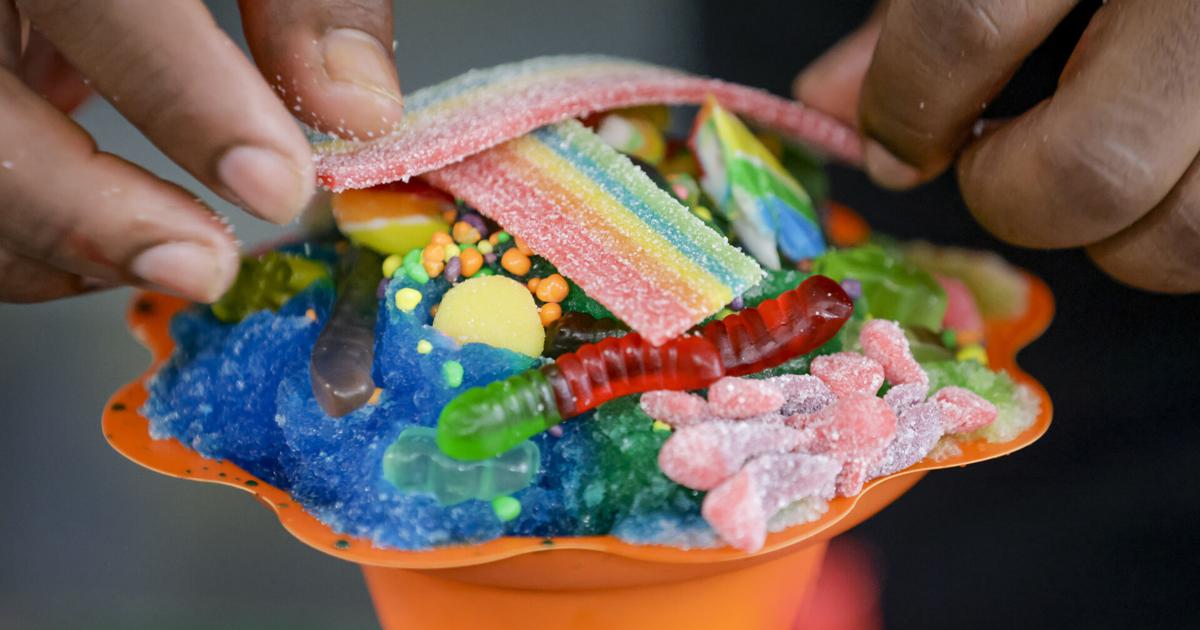Gov. Jeff Landry holds out a a letter to President Donald Trump and U.S. Agriculture Secretary Brooke Rollins asking for federal approval to ban using food stamps for soft drinks and candy with U.S. Department of Health and Human Services Secretary Robert F. Kennedy Jr. over his shoulder during a bill signing with Gov. Jeff Landry at Pennington BMRC on Friday, June 27, 2025.
Javier Gallegos
The goal, according to Gov. Jeff Landry’s administration, is to improve health outcomes and reduce the state’s Medicaid costs by limiting access to foods linked to chronic diseases like diabetes and obesity.
“This is about getting Louisiana healthy again, which is in coordination with the President’s effort to make America healthy again,” Landry said on a recent podcast recorded at Prejean’s restaurant in Broussard. “Snickers is not for lunch.”
What’s no longer allowed
According to the federal waiver, Louisiana will prohibit SNAP purchases of soft drinks, which is defined as “any carbonated nonalcoholic beverage containing high fructose corn syrup or artificial sweeteners.”
A worker at the Coca-Cola United bottling plant in Elmwood prepares to move pallets of Coke products in an undated photo.
Provided by Coca-Cola Bottling Company United
Excluded are “flavored carbonated water,” drinks, those “that contain milk or milk products, soy, rice, or similar milk substitutes,” and beverages with “equal to or greater than 50% of vegetable or fruit juice by volume.” That means a drink like a smoothie containing sweeteners could be exempt if it also contains milk.
Energy drinks — or beverages “containing a stimulant such as fortified caffeine, guarana, glucuronolactone, or taurine” — are also off limits. The definition includes both carbonated and noncarbonated products formulated to “enhance energy, alertness, or physical performance.”
Shoppers can still buy black coffee, cold brew, lattes and other traditional coffee drinks, but not if they are enhanced with any kind of added vitamins or supplements for energy.
Candy is now on the banned list for SNAP recipients.
Staff photo by Ian McNulty
Finally, candy is on the banned list and is defined as “a preparation of sugar, honey, or other natural or artificial sweeteners in combination with chocolate, fruits, nuts, or other ingredients or flavorings in the form of bars, drops, or pieces.”
Not included are “protein bars, granola bars or baking ingredients such as sprinkles, chocolate melting wafers, toffee bits, or chocolate chips.”
A Clif or KIND bar is allowed, but peanut M&Ms or chocolate-covered nuts are not.
Bruce Greenstein, secretary of the Louisiana Department of Health, said that soda purchases alone account for about $350 million of the program’s total cost of $1.9 billion.
“When we eliminate that, we’re basically freeing up money for families to go ahead and buy better foods, whether it’s going to be rice and beans … meats, vegetables, dairy products — but more real food, rather than synthetic candies and drinks,” Greenstein said.
But some advocates who work to combat hunger worry the new SNAP restrictions could create confusion at the register.
“We can all envision somebody coming to the checkout counter ready to buy their groceries, and all of a sudden you can’t buy this, that and the other thing with the SNAP card,” said John Sillars, chief strategy officer at Second Harvest Food Bank. “I think that will be challenging for them.”
Sillars said his organization supports healthy eating, but the new rules “will mean some families are going to have fewer choices that align with their needs and budgets and the availability of items in nearby stores.”
Eating patterns are “influenced by several factors, including access to food, education and affordability,” he said, and should be paired with education and incentives for healthy purchases.
Recent changes to SNAP at the federal level eliminated funding that would go toward nutrition education.
Jessica Elliott, executive director of the Louisiana Retailers Association, said in an email that her members are concerned about the short timeline before the new rules take effect on Jan. 15, with “many operational changes to consider.”
There is a need for clear communication to avoid confusion at the register, she said, but “retailers will continue to provide a positive shopping experience for SNAP customers.”
What’s newly allowed
For the first time, the state will also allow SNAP recipients to purchase rotisserie chicken, a shift from long-standing federal rules banning hot food under the program, Greenstein said.
“Allowing rotisserie chicken or prepared food allows a parent on the way home from work to pick up foods that the kids could eat right there, instead of snack foods or sugar foods and pop,” Greenstein said during the podcast.
However, the waiver from the USDA specifically states it does not authorize hot foods or other changes to the program. It’s not clear how Louisiana will implement that change. A representative for Landry did not respond to questions.
Other grocery staples like meat, fresh and frozen fruits, and vegetables, grains, dairy and snacks like chips, crackers and ice cream are still available under the program.
The USDA approved the waiver as a two-year demonstration project through Jan. 2028. The state will be required to submit quarterly reports tracking purchasing trends, complaints and health outcomes. The program can be renewed for an additional three years.
